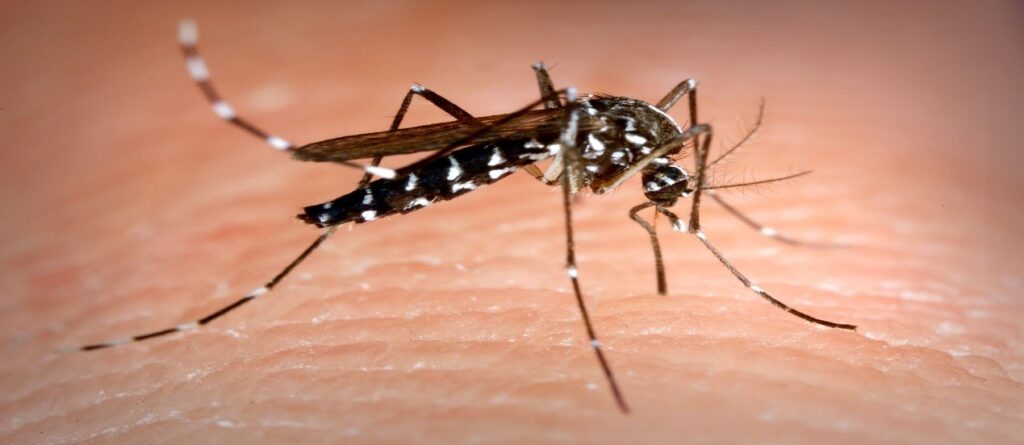Dengue fever is a mosquito-borne viral infection that poses a significant health threat in many tropical and subtropical regions. With its increasing incidence in Africa and more especially in Ghana, understanding its symptoms, prevention methods, and treatment options is crucial for reducing its impact.
What is Dengue Fever?
Dengue fever, also known as “Breakbone or 7-Day Fever” is caused by the Dengue virus, which is transmitted to humans through the bites of infected Aedes mosquitoes, primarily Aedes aegypti and Aedes albopictus. These mosquitoes are most active during the day, especially between sunrise and sunset. They thrive in urban areas, breeding in standing waters found in containers such as flower pots, tires, and buckets.
Symptoms of Dengue Fever
The symptoms of dengue fever typically appear 4 – 10 days after being bitten by a mosquito that carries the virus. Sometimes, these symptoms may appear as late as 2 weeks after the initial bite and may last 5 – 7 days. The symptoms can range from mild to severe, and may include the following:
• High Fever: Sudden onset of a high fever, often reaching up to 40°C (104°F).
• Severe Headache: Intense pain behind the eyes and forehead.
• Fatigue and Weakness: Extreme tiredness and a general feeling of being unwell, sometimes for days to weeks.
• Joint and Muscle Pain: Often referred to as “breakbone fever” due to the severe muscle and joint pains.
• Nausea and Vomiting: Gastrointestinal symptoms that can lead to dehydration.
• Skin Rash: Flat or small bumps may appear 2 – 5m days after the fever starts, potentially covering most of the body. The rash may or may not be itchy.
• Cough & Cold: Cough, sore throat and stuffy nose
• Mild Bleeding: Symptoms like nosebleeds, gum bleeding, or easy bruising.
In some cases, dengue fever can develop into severe dengue (also known as dengue hemorrhagic fever or dengue shock syndrome), which can be life-threatening. Severe dengue symptoms include severe abdominal pain, persistent vomiting, rapid breathing, bleeding gums, restlessness, and blood in vomit.
Prevention of Dengue Fever
Preventing dengue fever primarily involves avoiding mosquito bites and reducing mosquito populations. Key preventive measures include:
• Using Mosquito Repellents: Apply insect repellent containing DEET, picaridin, oil of lemon or eucalyptus to exposed skin. Do not use DEET on babies younger than 2months.
• Wear Protective Clothing: Long-sleeved shirts, long pants, socks, and shoes can reduce skin exposure. Insect repellants containing Permethrin can be applied on clothing as well.
• Using Mosquito Nets: Sleep under treated mosquito nets, especially in areas where dengue fever is prevalent.
• Draining Standing Water: Regularly empty and clean containers that hold water, such as flower pots and buckets, to prevent mosquitoes from breeding.
• Installing Screens: Use window and door screens to keep mosquitoes out of living spaces.
Treatment for Dengue Fever
There is no treatment for dengue fever. Management focuses on relieving symptoms and preventing complications. Key aspects of management include:
• Hydration: Maintaining fluid intake is crucial to prevent dehydration, especially if vomiting occurs.
• Pain Relief: Acetaminophen (paracetamol) can help reduce fever and alleviate pain. Avoid aspirin and nonsteroidal anti-inflammatory drugs (NSAIDs), e.g. diclofenac and ibuprofen, as they can increase bleeding risk.
• Medical Care: Seek medical attention if symptoms worsen or if signs of severe dengue fever appear. Hospitalization may be required for severe cases to provide supportive care, such as intravenous fluids and monitoring.
The Importance of Public Health Measures
Public health initiatives play a vital role in controlling dengue fever outbreaks. These measures include community education, mosquito control programs, and the development of vaccines. One such vaccine, Dengvaxia, has been approved in several countries, although its use is recommended primarily for individuals who have previously been infected with the dengue virus.
Conclusion
Dengue fever remains a significant public health challenge in many parts of the world. By understanding its symptoms, practicing preventive measures and seeking appropriate treatment, individuals can reduce their risk and contribute to the broader effort of controlling this potentially deadly disease. Public health authorities, communities, and individuals must work together to combat the spread of dengue fever and protect vulnerable populations.
References:
1. World Health Organization (WHO) General Information on Dengue: https://www.who.int/news-room/fact-sheets/detail/dengue-and-severe-dengue
2. Centers for Disease Control and Prevention (CDC): https://www.cdc.gov/dengue/index.html
3. Mayo Clinic:https://www.mayoclinic.org/diseases-conditions/dengue-fever/symptoms-causes/syc-20353078


